- Home
- Elizabeth Gaskell
The life of Charlotte Brontë Page 20
The life of Charlotte Brontë Read online
Page 20
“C BRONTË.”
“P. S.—Pray, sir, excuse me for writing to you a second time; I could not help writing, partly to tell you how thankful I am for your kindness, and partly to let you know that your advice shall not be wasted; however sorrowfully and reluctantly it may be at first followed. “C B.”
I cannot deny myself the gratification of inserting Southey’s reply:—
“Keswick, March 22, 1837.
“DEAR MADAM,
“Your letter has given me great pleasure, and I should not forgive myself if I did not tell you so. You have received admonition as considerately and as kindly as it was given. Let me now request that, if you ever should come to these lakes while I am living here, you will let me see you. You would then think of me afterwards with the more goodwill, because you would perceive that there is neither severity nor moroseness in the state of mind to which years and observation have brought me.
“It is, by God’s mercy, in our power to attain a degree of self-government, which is essential to our own happiness, and contributes greatly to that of those around us. Take care of over-excitement, and endeavour to keep a quiet mind (even for your health it is the best advice that can be given you): your moral and spiritual improvement will then keep pace with the culture of your intellectual powers.
“And now, Madam, God bless you!
“Farewell, and believe me to be your sincere friend,
“ROBERT SOUTHEY.”
Of this second letter also she spoke, and told me that it contained an invitation for her to go and see the poet if ever she visited the Lakes. “But there was no money to spare,” said she, “nor any prospect of my ever earning money enough to have the chance of so great a pleasure, so I gave up thinking of it.” At the time we conversed together on the subject we were at the Lakes. But Southey was dead.
This “stringent” letter made her put aside, for a time, all idea of literary enterprise. She bent her whole energy towards the fulfilment of the duties in hand; but her occupation was not sufficient food for her great forces of intellect, and they cried out perpetually, “Give, give,” while the flat and comparatively stagnant air of Dewsbury Moor told upon her health and spirits more and more. On August 27, 1837, she writes:—
“I am again at Dewsbury, engaged in the old business,—teach, teach, teach.... When will you come home? Make haste! You have been at Bath long enough for all purposes; by this time you have acquired polish enough, I am sure; if the varnish is laid on much thicker, I am afraid the good wood underneath will be quite concealed, and your Yorkshire friends won’t stand that. Come, come. I am getting really tired of your absence. Saturday after Saturday comes round, and I can have no hope of hearing your knock at the door, and then being told that ‘Miss E. is come.’ Oh dear! in this monotonous life of mine, that was a pleasant event. I wish it would recur again; but it will take two or three interviews before the stiffness—the estrangement of this long separation—will wear away”
About this time she forgot to return a work-bag she had borrowed, by a messenger, and in repairing her error she says:—“These aberrations of memory warn me pretty intelligibly that I am getting past my prime.” Ætat. 21! And the same tone of despondency runs through the following letter:—
“I wish exceedingly that I could come to you before Christmas, but it is impossible; another three weeks must elapse before I shall again have my comforter beside me, under the roof of my own dear quiet home. If I could always live with you, and daily read the Bible with you—if your lips and mine could at the same time drink the same draught, from the same pure fountain of mercy—I hope, I trust, I might one day become better, far better than my evil, wandering thoughts, my corrupt heart, cold to the spirit and warm to the flesh, will now permit me to be. I often plan the pleasant life which we might lead together, strengthening each other in that power of self derxial, that hallowed and glowing devotion, which the first saints of God often attained to. My eyes fill with tears when I contrast the bliss of such a state, brightened by hopes of the future, with the melancholy state I now live in, uncertain that I ever felt true contrition, wandering in thought and deed, longing for holiness, which I shall never, never obtain, smitten at times to the heart with the conviction that ghastly Calvinistic doctrines are true—darkened, in short, by the very shadows of spiritual death. If Christian perfection be necessary to salvation, I shall never be saved; my heart is a very hot-bed for sinful thoughts, and when I decide on an action I scarcely remember to look to my Redeemer for direction. I know not how to pray; I cannot bend my life to the grand end of doing good; I go on constantly seeking my own pleasure, pursuing the gratification of my own desires. I forget God, and will not God forget me? And, meantime, I know the greatness of Jehovah; I acknowledge the perfection of His word; I adore the purity of the Christian faith; my theory is right, my practice horribly wrong.”
The Christmas holidays came, and she and Anne returned to the parsonage, and to that happy home circle in which alone their natures expanded; amongst all other people they shrivelled up more or less. Indeed, there were only one or two strangers who could be admitted among the sisters without producing the same result. Emily and Anne were bound up in their lives and interests like twins. The former from reserve, the latter from timidity, avoided all friendships and intimacies beyond their sisters. Emily was impervious to influence; she never came in contact with public opinion, and her own decision of what was right and fitting was a law for her conduct and appearance, with which she allowed no one to interfere. Her love was poured out on Anne, as Charlotte’s was on her. But the affection among all the three was stronger than either death or life.
E. was eagerly welcomed by Charlotte, freely admitted by Emily, and kindly received by Anne, whenever she could come amongst them; and this Christmas she had promised to visit Haworth, but her coming had to be delayed on account of a little domestic accident detailed in the following letter:—
“Dec. 29, 1837.
“I am sure you will have thought me very remiss, in not sending my promised letter long before now; but I have a sufficient and very melancholy excuse in an accident that befell our old faithful Tabby, a few days after my return home. She was gone out into the village on some errand, when, as she was descending the steep street, her foot slipped on the ice, and she fell; it was dark, and no one saw her mischance, till after a time her groans attracted the attention of a passer-by. She was lifted up and carried into the druggist’s near; and, after the examination, it was discovered that she had completely shattered and dislocated one leg. Unfortunately, the fracture could not be set till six o’clock the next morning, as no surgeon was to be had before that time, and she now lies at our house in a very doubtful and dangerous state. Of course we are all exceedingly distressed at the circumstance, for she was like one of our own family. Since the event we have been almost without assistance—a person has dropped in now and then to do the drudgery, but we have as yet been able to procure no regular servant; and consequently, the whole work of the house, as well as the additional duty of nursing Tabby, falls on ourselves. Under these circumstances I dare not press your visit here, at least until she is pronounced out of danger; it would be too selfish of me. Aunt wished me to give you this information before, but papa and all the rest were anxious I should delay until we saw whether matters took a more settled aspect, and I myself kept putting it off from day to day, most bitterly reluctant to give up all the pleasure I had anticipated so long. However, remembering what you told me, namely, that you had commended the matter to a higher decision than ours, and that you were resolved to submit with resignation to that decision, whatever it might be, I hold it my duty to yield also, and to be silent; it may be all for the best. I fear, if you had been here during this severe weather, your visit would have been of no advantage to you, for the moors are blockaded with snow, and you would never have been able to get out. After this disappointment, I never dare reckon with certainty on the enjoyment of a pleasure again; it seems as if s
ome fatality stood between you and me. I am not good enough for you, and you must be kept from the contamination of too intimate society. I would urge your visit yet—I would entreat and press it—but the thought comes across me, should Tabby die while you are in the house, I should never forgive myself. No! it must not be, and in a thousand ways the consciousness of that mortifies and disappoints me most keenly. And I am not the only one who is disappointed. All in the house were looking to your visit with eagerness. Papa says he highly approves of my friendship with you, and he wishes me to continue it through life.”
A good neighbour of the Brontes—a clever, intelligent Yorkshire woman, who keeps a druggist’s shop in Haworth, and from her occupation, her experience, and excellent sense, holds the position of village doctress and nurse, and, as such, has been a friend, in many a time of trial, and sickness, and death, in the households round—told me a characteristic little incident connected with Tabby’s fractured leg. Mr. Brontë is truly generous and regardful of all deserving claims. Tabby had lived with them for ten or twelve years, and was, as Charlotte expressed it, “one of the family.” But, on the other hand, she was past the age for any very active service, being nearer seventy than sixty at the time of the accident; she had a sister living in Haworth; and the savings she had accumulated, during many years’ service, formed a competency for one in her rank of life. Or if, in this time of sickness, she fell short of any comforts which her state rendered necessary, the parsonage could supply them. So reasoned Miss Branwell, the prudent, not to say anxious aunt; looking to the limited contents of Mr. Brontë’s purse, and the unprovided-for future of her nieces; who were, moreover, losing the relaxation of the holidays, in close attendance upon Tabby.
Miss Branwell urged her views upon Mr. Brontë as soon as the immediate danger to the old servant’s life was over. He refused at first to listen to the careful advice; it was repugnant to his liberal nature. But Miss Branwell persevered; urged economical motives; pressed on his love for his daughters. He gave way. Tabby was to be removed to her sister’s and there nursed and cared for, Mr. Brontë coming in with his aid when her own resources fell short. This decision was communicated to the girls. There were symptoms of a quiet, but sturdy rebellion, that winter afternoon, in the small precincts of Haworth Parsonage. They made one unanimous and stiff remonstrance. Tabby had tended them in their childhood; they, and none other, should tend her in her infirmity and age. At tea-time, they were sad and silent, and the meal went away untouched by any of the three. So it was at breakfast; they did not waste many words on the subject, but each word they did utter was weighty. They “struck” eating till the resolution was rescinded, and Tabby was allowed to remain a helpless invalid entirely dependent upon them. Herein was the strong feeling of Duty being paramount to Pleasure, which lay at the foundation of Charlotte’s character, made most apparent; for we have seen how she yearned for her friend’s company; but it was to be obtained only by shrinking from what she esteemed right, and that she never did, whatever might be the sacrifice.
She had another weight on her mind this Christmas. I have said that Dewsbury Moor was low and damp, and that the air did not agree with her, though she herself was hardly aware how much her life there was affecting her health. But Anne had begun to suffer just before the holidays, and Charlotte watched over her younger sisters with the jealous vigilance of some wild creature, that changes her very nature if danger threatens her young. Anne had a slight cough, a pain at her side, a difficulty of breathing. Miss Wooler considered it as little more than a common cold; but Charlotte felt every indication of incipient consumption as a stab at her heart, remembering Maria and Elizabeth, whose places once knew them, and should know them no more.
Stung by anxiety for this little sister, she upbraided Miss Wooler for her fancied indifference to Anne’s state of health. Miss Wooler felt these reproaches keenly, and wrote to Mr. Brontë about them. He immediately sent for his children, who left Dewsbury Moor the next day. Meanwhile Charlotte had resolved that Anne should never return as a pupil, nor she herself as a governess. But, just before she left, Miss Wooler sought for the opportunity of an explanation of each other’s words, and the issue proved that “the falling out of faithful friends, renewing is of love.” And so ended the first, last, and only difference Charlotte ever had with good and kind Miss Wooler.
Still her heart had received a shock in the perception of Anne’s delicacy; and all this winter she watched over her with the longing, fond anxiety, which is so full of sudden pangs of fear.
Miss Wooler had entreated her to return after the holidays, and she had consented. But, independently of this, Emily had given up her situation in the Halifax school, at the expiration of six months of arduous trial, on account of her health, which could only be reestablished by the bracing moorland air and free life of home. Tabby’s illness had preyed on the family resources. I doubt whether Branwell was maintaining himself at this time. For some unexplained reason, he had given up the idea of becoming a student of painting at the Royal Academy, and his prospects in life were uncertain, and had yet to be settled. So Charlotte had quietly to take up her burden of teaching again, and return to her previous monotonous life.
Brave heart, ready to die in harness! She went back to her work, and made no complaint, hoping to subdue the weakness that was gaining ground upon her. About this time, she would turn sick and trembling at any sudden noise, and could hardly repress her screams when startled. This showed a fearful degree of physical weakness in one who was generally so self controlled; and the medical man, whom at length, through Miss Wooler’s entreaty, she was led to consult, insisted on her return home. She had led too sedentary a life, he said; and the soft summer air, blowing round her home, the sweet company of those she loved, the release, the freedom of life in her own family, were needed, to save either reason or life. So, as One higher than she had overruled that for a time she might relax her strain, she returned to Haworth; and after a season of utter quiet, her father sought for her the enlivening society of her two friends, Mary and Martha T. At the conclusion of the following letter, there is, I think, as pretty a glimpse of a merry group of young people as need be; and like all descriptions of doing, as distinct from thinking or feeling, in letters, it saddens one in proportion to the vivacity of the picture of what was once, and is now utterly swept away.
“Haworth, June 9, 1838.
“I received your packet of despatches on Wednesday; it was brought me by Mary and Martha, who have been staying at Haworth for a few days; they leave us to-day. You will be surprised at the date of this letter. I ought to be at Dewsbury Moor, you know; but I stayed as long as I was able, and at length I neither could nor dared stay any longer. My health and spirits had utterly failed me, and the medical man whom I consulted enjoined me, as I valued my life, to go home. So home I went, and the change has at once roused and soothed me; and I am now, I trust, fairly in the way to be myself again.
“A calm and even mind like yours cannot conceive the feelings of the shattered wretch who is now writing to you, when, after weeks of mental and bodily anguish not to be described, something like peace began to dawn again. Mary is far from well. She breathes short, has a pain in her chest, and frequent flushings of fever. I cannot tell you what agony these symptoms give me; they remind me too strongly of my two sisters, whom no power of medicine could save. Martha is now very well; she has kept in a continual flow of good humour during her stay here, and has consequently been very fascinating.....
“They are making such a noise about me I cannot write any more. Mary is playing on the piano; Martha is chattering as fast as her little tongue can run; and Branwell is standing before her, laughing at her vivacity.”
Charlotte grew much stronger in this quiet, happy period at home. She paid occasional visits to her two great friends, and they in turn came to Haworth. At one of their houses, I suspect, she met with the person to whom the following letter refers; some one having a slight resemblance to the character of
“St. John,” in the last volume of “Jane Eyre,” and, like him, in holy orders.8
“March 12, 1839.
.... “I had a kindly leaning towards him, because he is an amiable and well-disposed man. Yet I had not, and could not have, that intense attachment which would make me willing to die for him; and if ever I marry, it must be in that light of adoration that I will regard my husband. Ten to one I shall never have the chance again; but n’importe. Moreover, I was aware that he knew so little of me he could hardly be conscious to whom he was writing. Why! it would startle him to see me in my natural home character; he would think I was a wild, romantic, enthusiast indeed. I could not sit all day long making a grave face before my husband. I would laugh, and satirize, and say whatever came into my head first. And if he were a clever man, and loved me, the whole world, weighed in the balance against his smallest wish, should be light as air.”
So that—her first proposal of marriage—was quietly declined and put on one side. Matrimony did not enter into the scheme of her life, but good, sound, earnest labour did; the question, however, was as yet undecided in what direction she should employ her forces. She had been discouraged in literature; her eyes failed her in the minute kind of drawing which she practised when she wanted to express an idea; teaching seemed to her at this time, as it does to most women at all times, the only way of earning an independent livelihood. But neither she nor her sisters were naturally fond of children. The hieroglyphics of childhood were an unknown language to them, for they had never been much with those younger than themselves. I am inclined to think, too, that they had not the happy knack of imparting information, which seems to be a separate gift from the faculty of acquiring it; a kind of sympathetic tact, which instinctively perceives the difficulties that impede comprehension in a child’s mind, and that yet are too vague and unformed for it, with its half-developed powers of expression, to explain by words. Consequently, teaching very young children was anything but a “delightful task” to the three Brontë sisters. With older girls, verging on womanhood, they might have done better, especially if these had any desire for improvement. But the education which the village clergyman’s daughters had received, did not as yet qualify them to undertake the charge of advanced pupils. They knew but little French, and were not proficients in music; I doubt whether Charlotte could play at all. But they were all strong again, and, at any rate, Charlotte and Anne must put their shoulders to the wheel. One daughter was needed at home, to stay with Mr. Brontë and Miss Branwell; to be the young and active member in a household of four, whereof three—the father, the aunt, and faithful Tabby—were past middle age. And Emily, who suffered and drooped more than her sisters when away from Haworth, was the one appointed to remain. Anne was the first to meet with a situation.

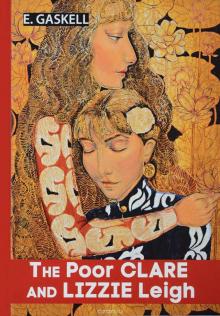 Lizzie Leigh
Lizzie Leigh The Poor Clare
The Poor Clare Lois the Witch
Lois the Witch North and South
North and South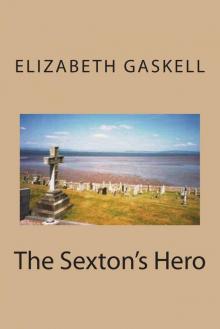 Sexton's Hero
Sexton's Hero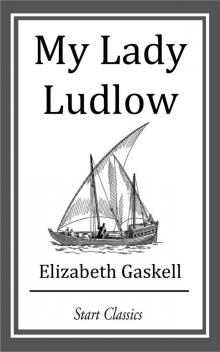 My Lady Ludlow
My Lady Ludlow Uncle Peter
Uncle Peter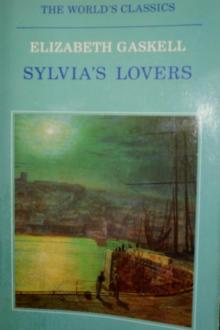 Sylvia's Lovers Elizabeth Cleghorn Gaskell
Sylvia's Lovers Elizabeth Cleghorn Gaskell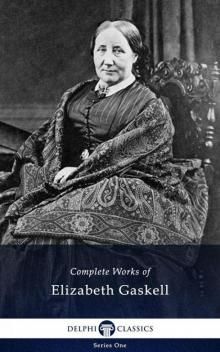 Delphi Complete Works of Elizabeth Gaskell
Delphi Complete Works of Elizabeth Gaskell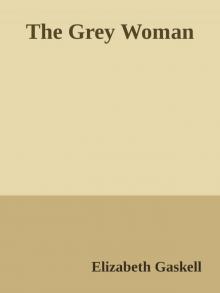 The Grey Woman
The Grey Woman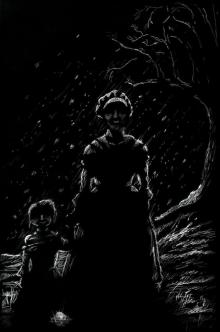 The Old Nurse's Story and Other Tales
The Old Nurse's Story and Other Tales Cranford
Cranford Gothic Tales
Gothic Tales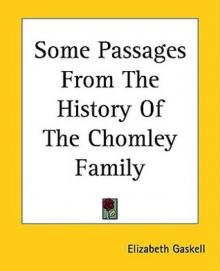 Some Passages From the History of the Chomley Family
Some Passages From the History of the Chomley Family An Accursed Race
An Accursed Race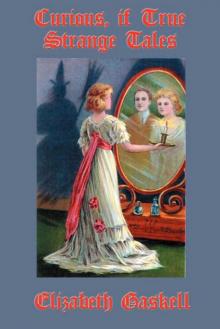 Curious, if True: Strange Tales Elizabeth Cleghorn Gaskell
Curious, if True: Strange Tales Elizabeth Cleghorn Gaskell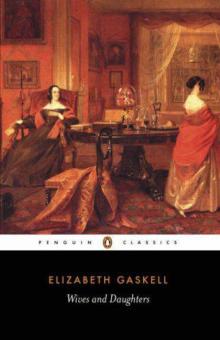 Wives and Daughters
Wives and Daughters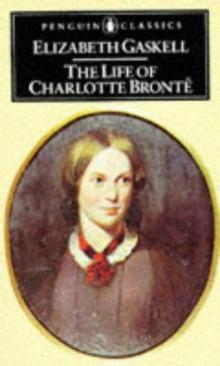 The life of Charlotte Brontë
The life of Charlotte Brontë